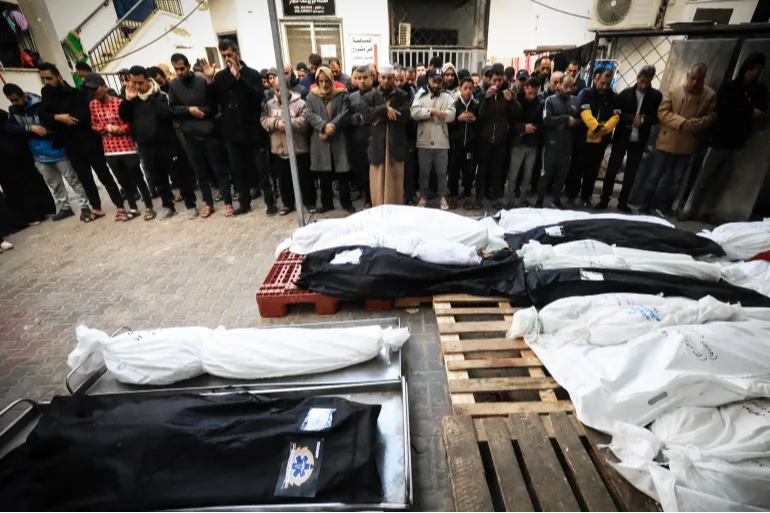
Rafah, December 21 (RHC)-- At least 20,000 people have been killed in the Gaza Strip since Israel began bombarding the enclave more than 10 weeks ago, according to Palestinian officials. More than 8,000 children and 6,200 women are among those killed, Gaza’s Government Media Office said on Wednesday.
The grim milestone was passed as the United Nations Security Council postponed a key vote on a bid to boost humanitarian aid for Gaza for the third time to avoid a veto from the United States, which traditionally shields its ally Israel from UN action.
Since a seven-day truce collapsed on December 1, the war has entered a more intensive phase with ground combat previously confined to the northern half of the territory now spread across its length.
When asked about the ever-growing casualty count, US Secretary of State Antony Blinken said it is “clear that the conflict will move and needs to move to a lower intensity phase.” “We expect to see and want to see a shift to more targeted [Israeli] operations with a smaller number of forces that’s really focused in on dealing with the leadership of Hamas, the tunnel network and a few other critical things,” he said. “And as that happens, I think you’ll see as well the harm done to civilians also decrease significantly.”
Air strikes continued across Gaza on Wednesday with at least 46 people killed and dozens wounded in Israeli attacks on the Jabalia refugee camp in northern Gaza, according to the enclave’s Ministry of Health.
In Rafah in the southern Gaza Strip, where hundreds of thousand of people have been pushed since early December by Israel’s continued onslaught, air strikes hit a building near a hospital close to an Al Jazeera crew reporting live on air, killing at least 10 people.
“More air strikes are conducted, more victims fall due to the expansion of the Israeli military operations in the areas that are supposed to be safe zones where the majority of Gazans have been urged to flee,” Al Jazeera’s Tareq Abu Azzoum said in reporting from Rafah.
“The air strike took place in an area considered to be very densely populated, and it’s a miracle that no more than this number of people were killed,” he added.
The UN Security Council vote on a bid to boost aid to the Gaza Strip and ask the UN to monitor humanitarian aid deliveries there has been delayed at the request of the United States, diplomats said.
According to the United Arab Emirates envoy to the UN, Lana Nusseibeh, the vote will take place on Thursday. “Everyone wants to see a resolution that has impact and is implementable on the ground, and there are some discussions going on on how to make that possible,” Nusseibeh, whose country drafted the resolution, told reporters in New York.
The text aims to dilute Israel’s control over all humanitarian aid deliveries to the 2.3 million people of Gaza. The initial text has been reportedly modified to soften calls to end the fighting in Gaza to avoid yet another veto from the US.
“We want to make sure that the resolution … doesn’t do anything that could actually hurt the delivery of humanitarian assistance, make it more complicated. That’s what we’re focused on,” Blinken told reporters on Wednesday. “I hope we can get to a good place.”
Currently, Israel monitors the limited humanitarian aid and fuel deliveries to Gaza via the Rafah crossing from Egypt and the Israel-controlled Karem Abu Salem crossing, known as Kerem Shalom in Hebrew.
On Wednesday, the first aid convoy entered Gaza directly from Jordan with 750 metric tonnes of food. The World Food Programme said half of Gaza’s population is starving and only 10 percent of the food required has entered Gaza since the war began on October 7th.
The U.S. and Israel oppose a ceasefire, believing it would benefit only Hamas. Washington instead supports pauses in fighting to protect civilians and allow the release of captives taken by Hamas.
Separately on Wednesday, Hamas leader Ismail Haniyeh paid his first visit to Egypt for more than a month in a rare personal intervention in diplomacy amid hopes that the Palestinian group and Israel could agree terms for another truce.
Haniyeh arrived in the Egyptian capital to meet with Cairo’s spy chief and other Egyptian officials who are acting as key mediators. Meanwhile, Israeli officials have indicated in talks with US and Qatari representatives that they could be open to a truce.
The Hamas leader last travelled to Egypt in early November before the announcement of the only pause in the fighting so far, a weeklong truce that saw the release of about 110 of 240 captives taken by Hamas into Gaza on October 7.
The Palestinian Islamic Jihad, a smaller armed group that is also holding captives in Gaza, said its leader would also visit Egypt in the coming days to discuss a possible end to the war.
A source briefed on the negotiations said envoys were discussing which of the captives still held by Palestinian groups could be freed in a new truce and what prisoners Israel might release in return, the Reuters news agency reported.
But there remains a huge gulf between the two sides’ publicly stated positions on any halt to the fighting. Hamas rejects any further temporary pause and says it will discuss only a permanent ceasefire. Israel has ruled that out and says it will agree only limited humanitarian pauses until Hamas is defeated.
U.S. President Joe Biden said he did not expect an Israel-Hamas deal for the release of captives held in Gaza to be struck soon.

